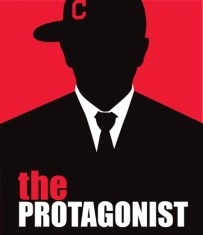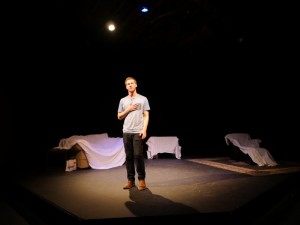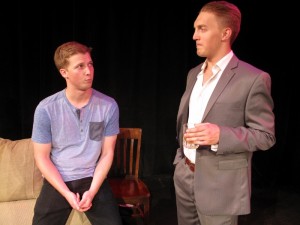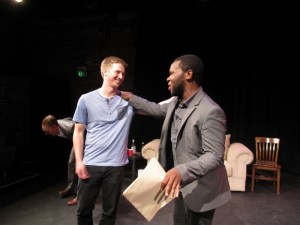AGONY UNVISITED
In this play by Tim Livingston, apparently his first, an artist and self-proclaimed protagonist named Joey (played by the author’s brother Joey Livingston) complains in verse about his desire to make a living as a rapper; his antagonist brother Tim (an enthusiastic Keenan Jolliff), who “works in finance,” bitches in couplets and iambs about Joey’s not getting his shit together. They talk to each other a little but mostly to the audience, which for some reason constitutes one wall of their apartments. (I say “one wall” advisedly, despite the Lillian’s thrust stage.) They spend at least half of this two-hour show “rapping” to us about problems that they imagine themselves to have. They’re white middle-class characters, so they call their issues White People Problems to avoid seeming racist, or insensitive to real people with real problems. But calling their problems “problems” in a stage production is insensitive to fictional people with real problems, like Oedipus or John Proctor.
Nobody in The Protagonist has real problems. There are things they want, but can’t have; but they’re not hungry or thirsty or spiritually empty, despite what they may tell us. There are no stakes in this universe. Practical issues are very easily solved: A job as a barback pays for an apartment in Los Feliz and plenty of name whiskey while leaving time for “auditions” (like the world of rap, that of acting is never explored); a job in the also-unintentionally mysterious world of “finance” buys a highrise penthouse and a Roth IRA. Issues of the soul, like love and good citizenship, are much talked about but do not progress action, the true measure of dramatic necessity.
I think it’s also because they’re white kids that Joey and Tim don’t really rap. They call it rap, or at least the playwright does, but what they’re doing is a low-energy version of the Spoken Word jams that had their heyday about twenty years back. Their poetry, credited to Tim Livingston, has some fine sentiments in it, some good jokes, and lots of briefly amusing references to TV and other mass-market consumer culture. There is some wisdom here; about twenty percent is well worth hearing. But it all lacks gravity. There is none of the moment-to-moment passion that marks good rap; Joey and Tim debate ethereal questions, not the existential issues that move Dr. Dre or Eminem. Joey and Tim use no backbeats, and what rhythm the language contains is preserved and presented a capella, which does not in itself disqualify what they’re doing as “rap;” but these guys aren’t rapping, not really, just as this is not really a satisfying or entertaining play.
Grant Gorrell’s set is uninspired but acceptable, presuming he had no budget at all; his lighting of bodies and space is less adequate, but given 25 instruments to delineate three spaces and a variety of emotions, this too may be forgiven. Jeremy Guskin has directed on this broad, multi-sided stage as if for a single television camera, with most of the dialogue and stage picture aimed at the stage manager’s booth, ignoring two-thirds of the house. The actors are occasionally excellent and almost always competent (Christian Roberts makes much of his multiple characters; Libe Barber is less successful). But they have nothing to do.
Tim Livingston’s play features a trouble-free plot, substituting multiple ten- and fifteen-minute rhymed soliloquies for character development and dramatic action. The play is rife with self-reference, extending to criticism of the production and of the medium itself, which is perhaps to be expected from a play produced by an entity calling itself a film company. The second act begins with its best writing; inexplicably, it’s a scene from the 2001 film Zoolander (written by Drake Sather, Ben Stiller and John Hamburg, well performed here by Roberts). The presence of this movie in this stage production is given an unacceptable half-explanation later on, but it’s hard to credit, given the stylistic inconsistencies that accrue by its inclusion in this way. Eventually someone almost overdoses on Xanax (white people problems indeed), and gets over the romantic crush that has been bothering him. In the falling action, Joey blithely announces that rap, his ostensible artistic inspiration, isn’t that important to him, making me wonder what the hell I’ve been watching. The protagonist does nothing, certainly overcomes no obstacle, to earn his antagonist’s about-face respect and support, but he gets them both anyway, and the writing suggests that he ought to have ours, too.
At the end of this play written by one brother for another, in which the characters share the names of their author and actor, one brother congratulates the other for finally having had some life experience that can be used as fuel for his art. In fact nothing of the sort has really happened; if anything, the antagonist in this piece is quite right at the start regarding his unmotivated dreamer of a little brother, and nothing occurs to contradict his opinion. Of course what this play represents is two brothers who want to make it in Hollywood, having written about exactly that with not even a fictitious business license between themselves and their avatars. Solipsism 101 teaches us: Don’t do this. But I do wish the Livingstons well. Tim has a pleasing way with topical one-liners, if not yet with story or plot; and Joey is a likeable presence with good diction who, with experience and the advantage of a character on the page from which to draw, may grow into an interesting actor. I hope life imitates art and helps the brothers to do better next time.
photos by Michael Fakely
The Protagonist
Carthay Films
Lillian Theatre, 1076 Lillian Way in Hollywood (near Santa Monica and Vine)
Thurs–Sat at 8
scheduled to end on August 9, 2014
for tickets ($19), call (323) 571-2288 or visit www.theprotagonist.ticketleap.com





